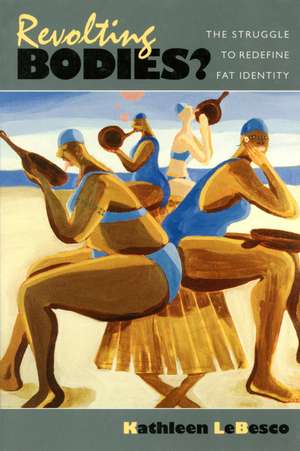Revolting Bodies?: The Struggle to Redefine Fat Identity
Autor Kathleen A. LeBescoen Limba Engleză Paperback – 16 dec 2003
Viewed as both unhealthy and unattractive, fat people are widely represented in popular culture and in interpersonal interactions as revolting—as agents of abhorrence and disgust. Yet if we think about "revolting" in a different way, Kathleen LeBesco argues, we can recognize fatness as not simply an aesthetic state or a medical condition, but a political one. If we think of revolting in terms of overthrowing authority, rebelling, protesting, and rejecting, then corpulence carries a whole new weight as a subversive cultural practice that calls into question received notions about health, beauty, and nature.
Revolting Bodies examines a number of sites of struggle over the cultural meaning of fatness. The book is grounded in scholarship on identity politics, the social construction of beauty, and the subversion of hegemonic medical ideas about the dangers of fatness. It explains how the redefinition of fat identities has been undertaken by people who challenge conventional understandings of nature, health, and beauty and, in so doing, alter their individual and collective relationships to power.
LeBesco explores how the bearer of a fat body is marked as a failed citizen, inasmuch as her powers as a worker, shopper, and sexually "desirable" subject are called into question. At the same time, she highlights fat fashion, relations among fat, queer, and disability politics and activism, and online communities as opportunities for transforming these pejorative stereotypes of fatness. Her discussion of the long-term ramifications of denying bodily agency—in effect, letting biological determinism run rampant—has implications not only for our understanding of fatness but also for future political practice.
Revolting Bodies examines a number of sites of struggle over the cultural meaning of fatness. The book is grounded in scholarship on identity politics, the social construction of beauty, and the subversion of hegemonic medical ideas about the dangers of fatness. It explains how the redefinition of fat identities has been undertaken by people who challenge conventional understandings of nature, health, and beauty and, in so doing, alter their individual and collective relationships to power.
LeBesco explores how the bearer of a fat body is marked as a failed citizen, inasmuch as her powers as a worker, shopper, and sexually "desirable" subject are called into question. At the same time, she highlights fat fashion, relations among fat, queer, and disability politics and activism, and online communities as opportunities for transforming these pejorative stereotypes of fatness. Her discussion of the long-term ramifications of denying bodily agency—in effect, letting biological determinism run rampant—has implications not only for our understanding of fatness but also for future political practice.
Preț: 177.32 lei
Preț vechi: 197.60 lei
-10% Nou
Puncte Express: 266
Preț estimativ în valută:
33.93€ • 35.06$ • 28.24£
33.93€ • 35.06$ • 28.24£
Carte indisponibilă temporar
Doresc să fiu notificat când acest titlu va fi disponibil:
Se trimite...
Preluare comenzi: 021 569.72.76
Specificații
ISBN-13: 9781558494299
ISBN-10: 1558494294
Pagini: 192
Dimensiuni: 152 x 225 x 13 mm
Greutate: 0.29 kg
Ediția:First Edition
Editura: University of Massachusetts Press
Colecția University of Massachusetts Press
ISBN-10: 1558494294
Pagini: 192
Dimensiuni: 152 x 225 x 13 mm
Greutate: 0.29 kg
Ediția:First Edition
Editura: University of Massachusetts Press
Colecția University of Massachusetts Press
Notă biografică
Kathleen LeBesco is assistant professor of communication arts at Marymount Manhattan College.
Recenzii
"Most of the prior literature in this field has consisted of isolated studies published in medical journals that show that diets don't work and that the general public has extremely negative views about fat people. It is time that the discourse about fat oppression looks more closely at sociocultural issues, and that is the focus of LeBesco's book. This is a significant contribution to the fields of women's studies, health, medicine, and all social sciences."—Esther D. Rothblum, coeditor of Fat Oppression and Psychotherapy: A Feminist Perspective
"I can think of no other book that resembles Revolting Bodies? No one else has theorized on the shifting, self-contradicting, wildly political rhetoric of fat oppression. I look forward to using the book in my undergraduate women's studies classes, and I can imagine that it will be used in graduate courses in anthropology, philosophy, and psychology, as well as more professionally oriented classes in social work and nursing. . . . Lively, accessible, stimulating, and at times even profound."—Michèle A. Barale, coeditor of The Lesbian and Gay Studies Reader
"Revolting Bodies?The Struggle to Redefine Fat Identity, is a seminal work in fat studies. 'Katie is trying to erase the line between fat and thin,' says Marilyn Wann, an activist who started a fat-studies e-mail list last year that has 120 subscribers. 'Her work is foundational.'"—The Chronicle of Higher Education
"I can think of no other book that resembles Revolting Bodies? No one else has theorized on the shifting, self-contradicting, wildly political rhetoric of fat oppression. I look forward to using the book in my undergraduate women's studies classes, and I can imagine that it will be used in graduate courses in anthropology, philosophy, and psychology, as well as more professionally oriented classes in social work and nursing. . . . Lively, accessible, stimulating, and at times even profound."—Michèle A. Barale, coeditor of The Lesbian and Gay Studies Reader
"Revolting Bodies?The Struggle to Redefine Fat Identity, is a seminal work in fat studies. 'Katie is trying to erase the line between fat and thin,' says Marilyn Wann, an activist who started a fat-studies e-mail list last year that has 120 subscribers. 'Her work is foundational.'"—The Chronicle of Higher Education
